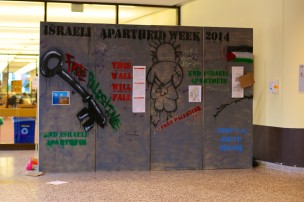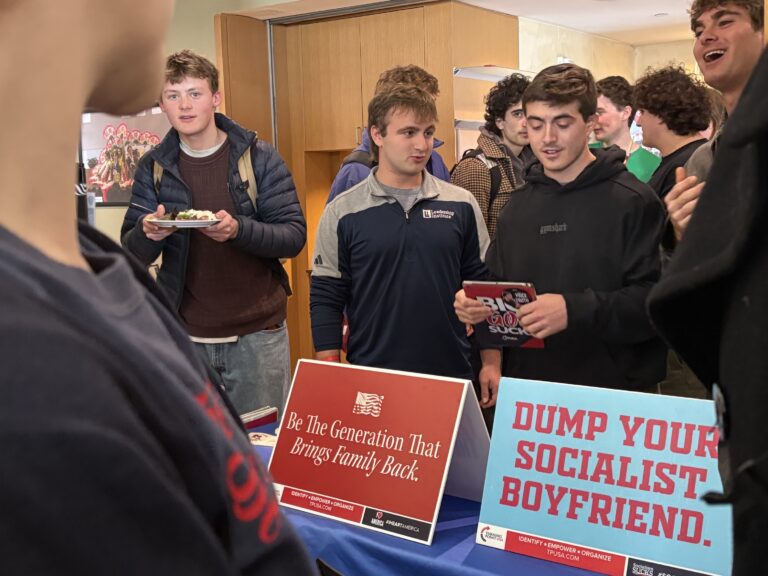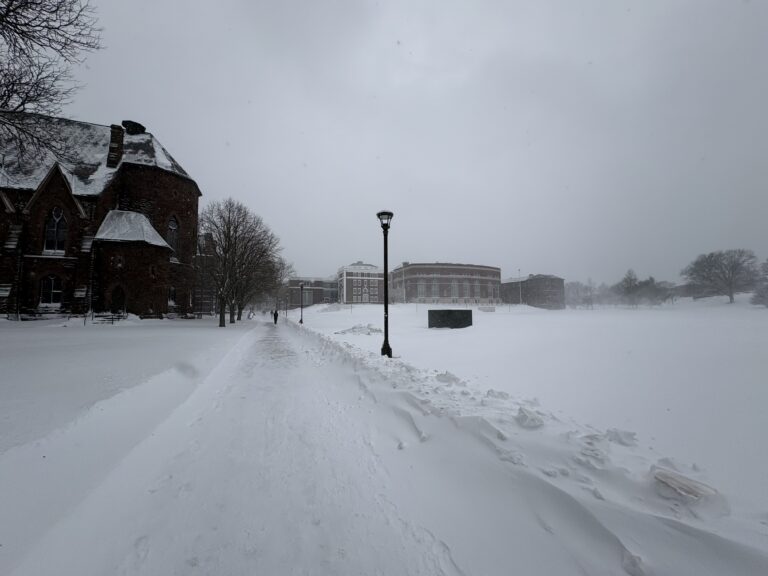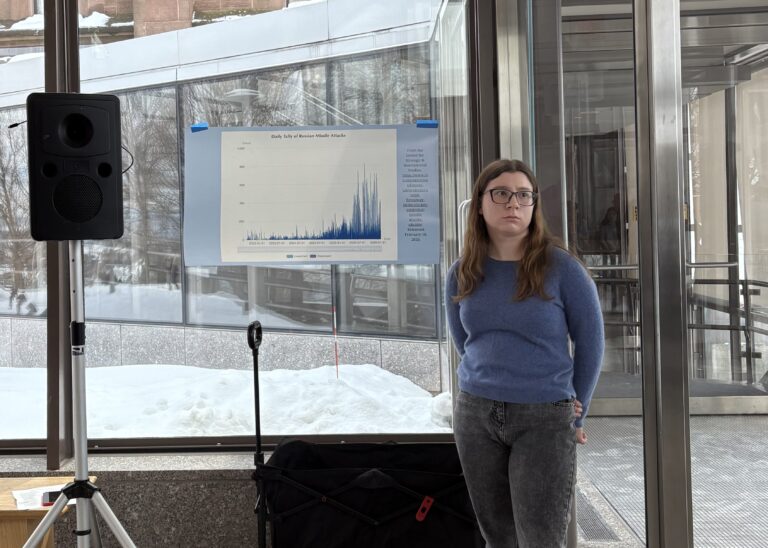Israeli Apartheid Week Generates Negative Reaction On Campus
 Around the world, the week of Feb. 24-28 is recognized as Israeli Apartheid Week, a pro-Palestine awareness event. Wesleyan Students for Justice in Palestine (WeSJP), a group that promotes justice, human rights, and liberation for the Palestinian people, has sponsored a version of this awareness week at the University.
Around the world, the week of Feb. 24-28 is recognized as Israeli Apartheid Week, a pro-Palestine awareness event. Wesleyan Students for Justice in Palestine (WeSJP), a group that promotes justice, human rights, and liberation for the Palestinian people, has sponsored a version of this awareness week at the University.
“Israeli Apartheid Week (IAW) is an international series of events that seeks to raise awareness about Israel’s apartheid policies towards the Palestinians and to build support for the growing Boycott, Divestment, and Sanctions (BDS) campaign,” the official website reads.
Harry Russell ’17, a member of WeSJP, stated that the week is a time to encourage campus dialogue about the Israel-Palestine conflict.
“[It is] for…students who are already familiar, who come from Jewish backgrounds or Palestinian backgrounds, or who are just interested in history and post-colonial movements,” Russell said. “But [the week also serves] to capture the attention of students who have maybe never heard of this issue, who don’t really know much about the politics of the region or the history, [and] to basically introduce the struggle to them as one of many struggles against colonialism and imperialism and generally against oppression and for freedom and self-determination and human rights.”
Russell stated that WeSJP has tried to recreate some of the primary symbols of the Israel-Palestine conflict to promote Israeli Apartheid Week.
“We built a mock separation wall, loosely based off of the separation wall between the West Bank and Israel and just tried to put some similar graffiti as to what is on the wall around Bethlehem especially,” Russell said. “We placed infographics and facts, and every day we’re replenishing the folder with articles.”
Becca Caspar-Johnson ’15, director of J Street U at the University, stressed that she does not find the event to be a positive
way of generating conversation. J Street U supports a two-state solution, and is unaffiliated with Israeli Apartheid Week.
“We don’t think the occupation [in Palestine] is right and we’re trying to end it,” Caspar-Johnson said. “But our model for change is you need to change the conversation, which means there needs to be a conversation. We see a problem with Israel Apartheid Week in that it uses tactics that just shut people down and make people feel defensive and attacked.”
Rebecca Markell ’14 stated that the wall was not effective in creating dialogue and was a sensitive symbol that emotionally disturbed University students.
“For me, it unnecessarily condenses this really complex conflict into one melodramatic piece of furniture,” Markell said. “It’s really painfully emotional to see this piece of hate. That’s something that represents hate of me, all of my family who happens to be Israeli, and people I know that love and support Israel, and that’s not saying that they don’t criticize it, but that they have an identity with the country. So I guess the main problem for me is that I don’t see it as creating dialogue; I just see it as expressing hate.”
Markell continued, expressing concern about the negative impact the wall may have on students’ attitudes regarding the Israel-Palestine conflict.
“The main emotion that I’ve heard is people sad that this is what we’ve come to, that we’re so unable to create a dialogue that someone has to put up a wall,” Markell said.
Emma Golub ’16 stressed that people who were uninformed about the Israel-Palestine conflict may be influenced by the wall to support one side without learning about both sides’ positions.
“It’s difficult because if someone who doesn’t know that much about the conflict walks by this banner, it’s very eye-grabbing, and it’s right there, and I can see myself if I didn’t know anything about it being like, ‘Yeah! This is awesome!’ but it’s very one-sided,” Golub said. “I totally think we should criticize and challenge what Israel is doing, but [while the wall] might produce dialogue, I don’t think it would produce friendly dialogue.”
Russell expressed curiosity toward negative reaction to the wall, saying he hoped to speak further with those who felt emotionally disturbed by its presence.
“First thing I would ask them is why they feel that way, seeing as the wall represents a real thing, and it’s not an exaggeration in any way,” Russell said. “If anything, it’s much smaller than the actual scale of the wall, which is a good 40 feet high and covers a much larger distance. I think many people who would be offended might be offended simply due to a lack of knowledge.… I would be mostly interested in why they’re offended, because that’s not our purpose. I don’t really see how that can arise.”
Golub also feels that the word “apartheid” is an incorrect term to describe the events in Israel.
“What’s happening in Israel is not apartheid,” Golub said. “I posted a video in our [group’s] Facebook group that’s a member of the South African Congress saying how he grew up during apartheid in the 1930’s and how he’s been to Israel and he’s been in a hospital in a bed in-between an Arab and a Jew being treated equally. They use the same bathrooms. It’s not apartheid. There’s certainly discrimination against Arabs in Israel, absolutely, but it’s not apartheid. This guy said that calling what is happening in Israel ‘apartheid’ is like lessening the apartheid that really did happen in South Africa because it’s the wrong term.”
Parent ’12 Robin Kelley, a Professor of U.S. History at UCLA, expressed a more neutral view, stating that he was not surprised by students participating in Israeli Apartheid Week at the University, especially due to the frequent involvement of students in social justice issues. Kelley previously denounced President Michael Roth’s position on American Studies Association’s boycott of Israeli Academic Institutions.
“Your school has a long and noble history of student activism, but more importantly, of student questioning, interrogating, struggling with hard issues,” Kelley wrote in an email to The Argus. “Historically, neither the students nor faculty have been provincial, nor has there been a history of knee-jerk reaction to any criticisms of Israel or any country for that matter. You are a school designed to [train] humanists in an Enlightened tradition, not hemmed in by narrow nationalisms or patriotisms, or kowtowed by fear.”
Caspar-Johnson stated that she felt Israeli Apartheid Week and the ASA’s recent boycotting of Israeli Academic Institutions both shut down conversation before it could begin.
“I think the only way to achieve change on this issue is through changing the conversation that needs to happen,” Caspar-Johnson said. “And I think that these actions were both very clear examples of conversation being shut down.”
Markell described a potential project that Wesleyan Students United with Israel is considering in response to Israeli Apartheid Week. The project would aim to gauge student reaction to the wall and coordinate a productive response.
“[We are considering] having individuals write why they support Israel, why they don’t support this action, and holding it up and making some sort of collage or poster and putting it somewhere on campus, or even a video of it,” Markell said. “Having it be Wesleyan voices is the way to go because…we want to hear why and where they’re coming from and have their views shared around campus.”







“The main emotion that I’ve heard is people sad that this is what we’ve come to, that we’re so unable to create a dialogue that someone has to put up a wall,” Markell said.
That is what Israel did, and the wall has been there for decades. The actual separation wall is much more of a piece of hate than this wall is. Imagine how Palestinians feel every day when they see the wall and it reminds them of how trapped they are.
This piece encourages dialogue – that is what we are doing right now.
Please don’t follow Michael Roth by actively shutting down dialogue
ich bin ein berliner
Get an education before spewing anymore Jew-hatered! You are disgusting! This singling out is just mind boggling.
http://www.theguardian.com/world/ng-interactive/2013/nov/walls#intro
Please don’t follow Michael Roth by actively shutting down dialogue
“The main emotion that I’ve heard is people sad that this is what we’ve come to, that we’re so unable to create a dialogue that someone has to put up a wall,” Markell said.
That is what Israel did, and the wall has been there for decades. The actual separation wall is much more of a piece of hate than this wall is. Imagine how Palestinians feel every day when they see the wall and it reminds them of how trapped they are.
This piece encourages dialogue – that is what we are doing right now.
Apartheid goes beyond which racial groups you
can sit with or go to the bathroom with. Golub’s narrow understanding of what
racial discrimination looks like inside Israel neglects structural inequalities
that cause oppression on a daily level. It also misconstrues the notion of
racism itself—a system of structural inequality and resource distribution based
on perceived biological differences between people. For example Israeli
citizens are often expected to present proof of service in the IDF in order to
gain employment. (Palestinian citizens of Israel do not serve in the IDF and
therefore have unequal access to employment). This does not even address the
separate road systems, legal statuses, and access to drinking water for
non-Jews living in the Occupied West Bank.
Journalist and author Jonathan Cook
explains the difference between petty apartheid
and grand apartheid:
“Now
one of the criticisms people make when you start accusing Israel of being an
Apartheid state inside its own borders is that they’ll say, ‘Well, Palestinians
can sit next to Jews inside restaurants. They sit on the same buses.
They go to the same cinemas,’ and that’s true, but that’s not really the
significance of Apartheid. The idea of Apartheid isn’t really about the
fact that people can’t sit on the same park bench. [In South Africa] It
was about controlling resources, making sure that one ethnic group had control
of resources over the other. And, in that sense, Israel has been very,
very effective at doing this, what we might call grand Apartheid rather than
petty Apartheid. In the key areas of people’s lives, their education, their
employment, owning land, Palestinian citizens are treated entirely differently
from Jewish citizens, and I think that’s one of the reasons why this Apartheid
comparison can be made.”
http://www.journeyman.tv/?lid=64252&tmpl=transcript
Apartheid goes beyond which racial groups you
can sit with or go to the bathroom with. Golub’s narrow understanding of what
racial discrimination looks like inside Israel neglects structural inequalities
that cause oppression on a daily level. It also misconstrues the notion of
racism itself—a system of structural inequality and resource distribution based
on perceived biological differences between people. For example Israeli
citizens are often expected to present proof of service in the IDF in order to
gain employment. (Palestinian citizens of Israel do not serve in the IDF and
therefore have unequal access to employment). This does not even address the
separate road systems, legal statuses, and access to drinking water for
non-Jews living in the Occupied West Bank.
Journalist and author Jonathan Cook
explains the difference between petty apartheid
and grand apartheid:
“Now
one of the criticisms people make when you start accusing Israel of being an
Apartheid state inside its own borders is that they’ll say, ‘Well, Palestinians
can sit next to Jews inside restaurants. They sit on the same buses.
They go to the same cinemas,’ and that’s true, but that’s not really the
significance of Apartheid. The idea of Apartheid isn’t really about the
fact that people can’t sit on the same park bench. [In South Africa] It
was about controlling resources, making sure that one ethnic group had control
of resources over the other. And, in that sense, Israel has been very,
very effective at doing this, what we might call grand Apartheid rather than
petty Apartheid. In the key areas of people’s lives, their education, their
employment, owning land, Palestinian citizens are treated entirely differently
from Jewish citizens, and I think that’s one of the reasons why this Apartheid
comparison can be made.”
http://www.journeyman.tv/?lid=64252&tmpl=transcript
pissed about a fake apartheid wall but unphased by the real one apparently you and your family have seen…. #liberaldiscourse
Or the real one keeps out terrorists and this fake one does nothing but inspire hate? What country doesn’t have fences/walls around its borders?
the wall isn’t around israel’s borders
Palestine: Peace Not Apartheid[1] is a New York Times Best Seller book written by Jimmy Carter, 39th President of the United States(1977–1981) and winner of the 2002 Nobel Peace Prize.
pissed about a fake apartheid wall but unphased by the real one apparently you and your family have seen…. #liberaldiscourse
Ignorant people unfortunately decided to call the week “Israel Apartheid Week” which is incredibly disrespectful to the events that occurred and are STILL occurring in South Africa.
Oppose colonialism in all its forms. This is not about petty nationalisms. Solidarity with the Israeli working class and down with the millitarized Israeli state.
“We know too well that our freedom is incomplete without the freedom of the Palestinians.”
http://stop30billion.org/
http://endtheoccupation.org/
You want real apartheid? Try this…
“To clarify: Wahhabism is the only officially recognized and allowed religion in Saudi Arabia. Other forms of Islam and other religions are banned and persecuted by the state.
Saudi Arabia is the only Islamic state in which there is no church, no synagogue and no other place of worship of any other religion.
Shiite Muslims have been systematically discriminated against for decades. Jews are even forbidden to enter the Kingdom.
Saudi Arabia practices a form of Sharia law that is one of the most brutal systems in the world. Saudi Arabia has at all times rejected the Universal Declaration of Human Rights of 1948.
Women may not drive a car and can be punished by flogging.
Corporal punishment, including amputations and executions, are part of everyday life in the country. Just two weeks ago a Sudanese immigrant in Saudi Arabia was publicly beheaded for ‘sorcery.’ Saudi Arabia is one of the few countries in the world in which the death penalty is enforced even on teenagers,” the paper said.
The facts are the facts, Jack…
I love it when Muslims lecture us about diversity or accuse Israel of ethnic cleansing, apartheid or intolerance. What follows is the percentage Muslim
demographic in the following countries. Bear in mind when studying these statistics that in every one of these countries 1,400 years ago (or less) Islam did not even exist.
Afghanistan 100% Muslim
(Once Buddhist, Hindu)
Algeria 99%
Muslim (Once Berber)
Bahrain 100% Muslim
(Once Zoroastrain, Christian)
Iraq 95% Muslim (Once Christian, Jewish, Zoroastrian)
Iran 98% Muslim (Once Christian, Zoroastrian, etc…)
Morocco 99%
Muslim (Once Berber, Christian, etc…)
Mauritania 100%
Muslim (Once Animist)
Somalia 100%
Muslim (Once Animist, etc…)
Saudi Arabia 100%
Muslim (Once Jewish, Christian,
Zoroastrian, etc…)
Sudan 97% Muslim
(Recent history teaches us what happened to all the non-Muslims in Sudan. It’s called genocide.)
acts about Israel
Israel, a country the size of New Jersey can only claim to the following achievements:
• Israel was established upon the ruins of another nation that it destroyed; Palestine
• Israel hold the world record in the number of towns & villages it ethnically cleansed…500+
• Israel holds the world record in the number of refugees it deported…4 million +
• Israel holds the world record in the number of homes it demolished…60 thousand +… See More
• Israel is the country with the highest record of UN condemnation…500+ times
• Israel is the country with the highest number of protective US Security council vetoes…100+ times
• Israel has killed more innocent civilians per capita than any other country…50 thousand+
• Israel has imprisoned more civilians per capita than any other country…250 thousand+
• Israel has rendered more innocent civilians handicapped per capita than any other country…50 thousand+
• Israel has injured more innocent civilians per capita than any other country…200 thousand+
• Israel has only two countries to defend its policies in the United Nations. These countries are America & Micronesia. The population for Micronesia as of June 2008 is only 108000
• Israel is the only country on Earth that denies the right of return of refugees
• Israel is the only country on Earth that still occupies a whole other country & parts of two other countries
• Israel is the only country on Earth that publicly, steals the water of its neighbours
• Israel is the only country on Earth that has legalized home demolishing as a method of collective punishment
• Israel is the only country on Earth that uproots trees as a method of collective punishment
• Israel is the only country on Earth that deliberately targets civilian infrastructure and justifies it
• Israel is the only country on Earth that legalized assassination
• Israel stands unique in using human shields in military operations
• Amongst all countries, Israel is the only one that has legalized torture
• Israel is the only country on Earth that builds illegal settlements in occupied lands
• Israel is the only country on Earth that publicly jails activists without trial
• According to the Guinness Book of World Records, Israel has created the highest number of checkpoints
• According to the Guinness Book of World Records, Israel holds the world record in the number of curfew its installed on the Palestinians
• Israel is the only country on Earth whose checkpoints deny women access to hospitals, they give birth alone and babies usually die
• Israel is exceptional in being the only country on Earth whose checkpoints denies patients access to hospitals, and they end up dying
• Israel is the only country on Earth whose checkpoints are where wedding parades come to an end
• Israel is the only country on Earth who checkpoints school children, denies them access to school, and puts an end to their classes
• Israel is one of two countries that, against International Law, use cluster bombs and depleted uranium bombs. America is the other…what a surprise huh?
• Israel holds the world record in the number of soldiers refusing to serve in the army
• Israel despite being a rich country, receives the highest financial aid, more than the sum aid to all sub-Saharan Africa!• Israel claims its enemies want to wipe it off the map, but it has indeed wiped a whole country called Palestine off the map!
• Israel is the county that has introduced nuclear weapons into the Middle East. But the only country in the Middle East that refuses to sign the nuclear non-proliferation treaty
• After East Germany, Israel is the only country that is building a segregation wall
• Second to South Africa, Israel is the only country to establish an apartheid regime
• Israeli engineers developed the worlds’ first iron gates on roads
• Israeli engineers developed the worlds’ first cities turned into jails with gates and opening hours
• Israeli engineers developed the worlds’ first apartheid walls
• Israeli engineers developed the worlds’ first electrified segregation fences
• Israeli engineers developed the worlds’ first ‘eyes specific’ rubber bullets
• Israeli engineers developed the worlds’ first abortion efficient, infant killing tear gas
• Israeli engineers developed the worlds’ first humiliation guaranteed human cages
• Israel is the only country on Earth that has a political party that publicly advocates ethnic cleansing of native citizens (Palestinians)
• Israel is the only country on Earth that still has racist laws that discriminate against native citizens (Palestinians)
• Israel is the only country on Earth known to have a memorial dedicated to a terrorist where his followers gather and dance•
Israel is the only country on Earth that imprisons kids for political reasons
• Israel is the only country on Earth where you get a one month community service for intentionally, smashing the head of a child! How much more proof do people need to see that Israel is a terrorist nation?????!!!!!!!!!
!• Israel is the only country on Earth that does not hold its soldiers accountable for shooting peace activists in cold blood
• No other country on Earth has towns and cities allocated exclusively for one ethnic group• The only country on Earth, where people live in homes stolen from living refugees is, Israel
• The only place on Earth where people cultivate fields stolen from living refugees is, Israe
l• Israel has the highest number of towns built upon ethnically cleansed villages, whose former residents are living refugees
• Israel ranks amongst the top countries in lack of security.
Facts about the Middle East:
* Israel has more companies listed on the NASDAQ than any country other than America thanks to Israel’s brilliant technology and business minds.
* Israel’s technology enables anti-Semites like the above writer to spread their hatred.
*Israel’s medical inventions have helped cure the weak and the sick.
* Israel’s democracy has enabled many Palestinians to serve in her Parliament. No Muslim country allows Palestinians citizenship much less the right to political office.
* Saudi Arabia (a Sharia state) does not have one single citizen who is not a Muslim. All non-Muslims are not allowed citizenship.
* Muslim killings of other Muslims is the single largest ethnic cleansing happening in the world today.
* Nine of the top ten countries that are killing Christians are Muslim countries. The lone exception is North Korea making nine Muslim countries on par with North Korea.
* Public stoning of women is one of Islam’s blood sports, as is hanging homosexuals in public.
* Islam is the only religion in conflict with every single religion in the world. Muslims have killed 5,000 Buddhists in southern Thailand. They are wiping out what remains of the Hindus in both Pakistan and India, they have committed genocide against the Animists and black Christians of Sudan AND Somalia, and they have wiped out or forced out all the Jews that once lived in Algeria, Morocco, Yemen, Iraq and elsewhere.
* Jews make up 25% of Nobel Prize winners.
* Muslims outnumber Jews by a thousand-fold but have won next to zero Nobel Prizes.
* Palestinians are judges, lawyers, doctors, professors, businessmen in Israel. In Syria they are being starved to death and killed.
* Palestinians from Gaza shot six thousand rockets into Israel before Israel took decisive action. What other country would practice this discipline?
* Yasser Arafat is said to have stolen up to a billion dollars in international aid from the people he supposedly cared about. His widow has many mansions in France and Switzerland.
* The leader of Hamas wears custom suits made in Italy.
* Hamas ties people it distrusts behind cars and then drags them through the streets until they die of shock.
* Fatah’s leader (Abbas) won a four year term as Prime Minister. He has now held office for ten years – the last six as an unelected official.
* Israel’s parliament if multi-faceted with liberals, conservatives, Palestinians and ultra-orthodox and everyone in between having their say.
I could go on for hours….
Oh wow! Companies on the NASDAQ! Stocks and bonds and Nobel prizes! Who gives a flying fuck? Jews in Germany often castrated Christian children and sucked their blood and put it into matzah balls (I can refer you to the many Hebrew sources which discuss this). Jews Christians Muslims are all crazy. There is only one real law. Good and evil. Love is better than hate.
Why did y’all kill Jesus?
To object to the wall on campus because it stops conversation is to object to the separation wall in Israel/Pa
Sentinel because it stops conversation and exchange. So sinc ethe wall on campus objects to the wall in Israel/Palestine, the person who objects to the campus wall is actually in agreement with its message. Further, to say that the symbolic wall expresses “hate” of one’s family is to say that Inez’s entire family supports the separation wall. I’d that really true? It seems that Jewish families everywhere are divided on the question of the wall. The symbolic wall expresses a political viewpoint and is engaging conversation. It is nether am act of hatred nor a conversation stopper, as evidenced by campus discussion. So why not affirm the value of political expression through art, especially when it objects to an injustice. It is not hateful to object to injustice. If it were, we could only be loving by embracing injustice. Bruno
Orwellian Apartheid.
There is not one single non-Muslim citizen in Saudi Arabia.
Afghanistan once home to a thriving Buddhist civilization is now 100% Muslim.
Pakistan once home to a thriving and ancient Hindu civilization is soon-to-be devoid of all Hindus. Meanwhile the Muslim population in India is soaring.
Yemen once home to a large Jewish population now has a dozen, or so, Jews left living there. The same is true in Iraq and Morocco.
Sudan once home to a large Christian and Animist people has seen most of these people killed or fled or forcibly converted to Islam.
Iran once home to a large, historic Zoroastrian community is helping to ensure these ancient people are ethnically cleans. The same thing is happening to the Assyrians of Syria, the Chaldeans of Iraq, the Copts of Egypt….
Meanwhile the Muslim demographic in Israel is soaring.
Islamic propaganda, supported by unhinged professors, knee-jerk liberals, politicians who have sold their soul for the petrol dollar and student who don’t have a brain between them all tell us it IS Israel that practices apartheid.
Orwellian apartheid, that is.
Israel has come out of the boils of the hell, a satanic state.
Norman Finkelstein: Israel is committing a holocaust in Gaza – Today’s Zaman
Since the mid-1970s, there’s been an international consensus for resolving the Israel-Palestine conflict. […] It’s called a two-state settlement, and a two-state settlement is pretty straightforward, uncomplicated. Israel has to fully withdraw from the West Bank and Gaza and Jerusalem, in accordance with the fundamental principle of international law, […] that it’s inadmissible to acquire territory by war. The West Bank, Gaza and Jerusalem, having been acquired by war, it’s inadmissible for Israel to keep them. They have to be returned. On the Palestinian side and also the side of the neighboring Arab states, they have to recognize Israel’s right to live in peace and security with its neighbors. That was the quid pro quo: recognition of Israel, Palestinian right to self-determination in the West Bank and Gaza with its capital in Jerusalem. That’s the international consensus. It’s not complicated. It’s also not controversial.
Norman Finkelstein & Former Israeli Foreign Minister Shlomo Ben-Ami Debate: Complete Transcript
What were the offers being made on each side of the Camp David and in the Taba talks? […] if you frame things in terms of what Israel was legally entitled to under international law, then Israel made precisely and exactly zero concessions. All the concessions were made by the Palestinians.
Norman Finkelstein & Former Israeli Foreign Minister Shlomo Ben-Ami Debate: Complete Transcript
“Israel has come out of the boils of the hell…”
True that. It came out of the Nazi Holocaust – a true man-made Hell.
……………
“Israel is committing a holocaust in Gaza….”
This must be why population growth is soaring in Gaza, mansions litter the Gazan Mediterranean coastline and obesity rates for men and women in Gaza are so high it ranks in the top worst in the world.
…………….
“All the concessions were made by the Palestinians.”
Earth to Douglass….come in please….Earth to Douglass….come in please…..Earth to Douglass….come in please….
What planet you living on Douglass cuz it sure ain’t planet Earth.
Arafat, you and I both know the Holocaust could have been avoided if it weren’t for the Zionists. The founders of Israel refused to budge a finger and allowed millions to perish in a burnt offering (holocaust).
Douglass,
Do not project your perverted thinking on me. I think I’d rather be dead than share in with your twisted, sickening thinking.
So the Jews are responsible for the Holocaust?!? This, Mr Isaacson, is exactly why Jews NEED a country to govern and defend. There will always be sad, ignorant, reprehensible people like you who will want to believe only the worst about Jews.